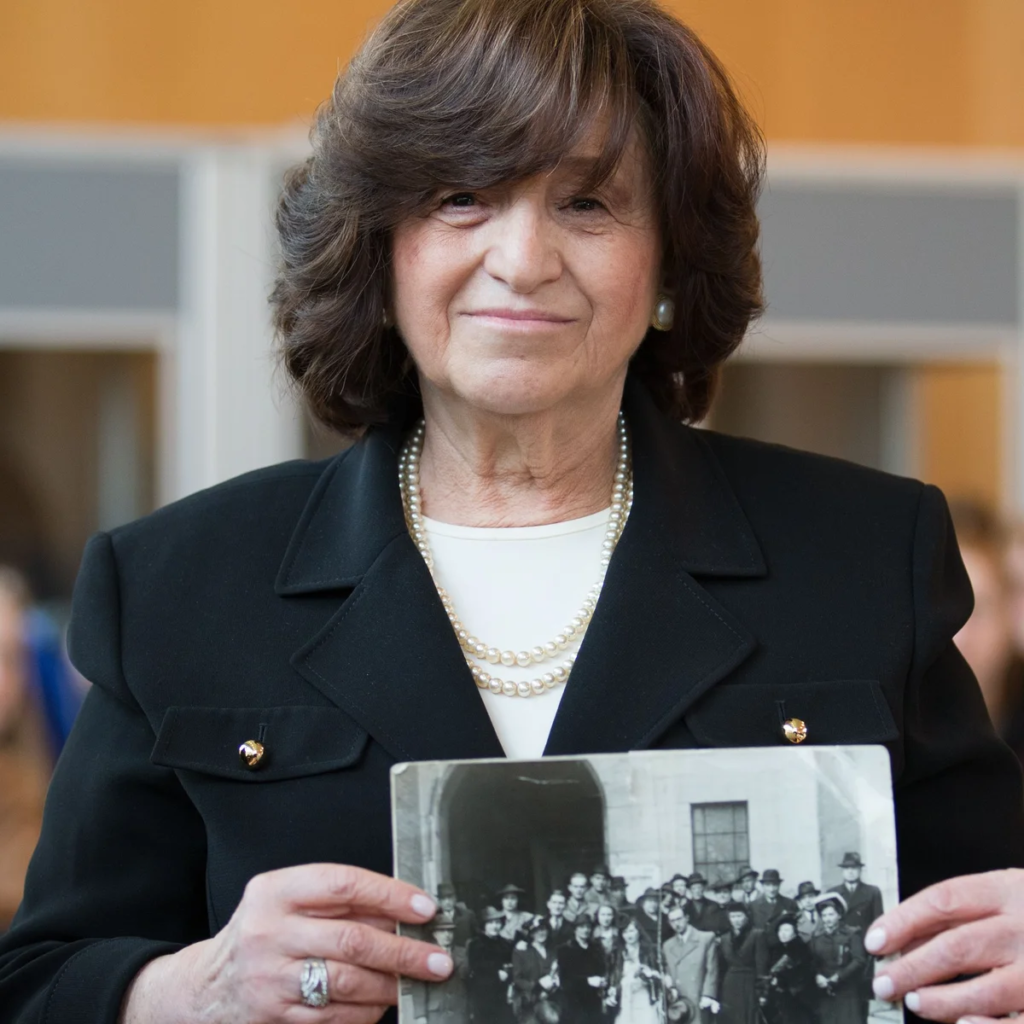Eva Clarke’s story is a harrowing tale of survival against unimaginable odds. Born on April 29, 1945, at the gates of Nazi concentration camp in Austria, her entry into the world came under circumstances most of us can scarcely fathom.
Her survival, and that of her mother, Anka Nathan, was due to a series of coincidental events that Eva Clarke refers to as “luck.” Their story serves as a stark reminder of the horrors of the Holocaust and the resilience of the human spirit.
A Family Torn Apart by the Holocaust
Eva Clarke’s parents, Bernd Nathan and Anka (Nathan) Bergman, were young, hopeful, and full of life when they married in May 1940.
They were among the first Jews deported to Theresienstadt labour camp because of their youth and physical strength, qualities that made them “well able to work.” Remarkably, the couple managed to survive in the camp for three years, which was an unusually long period given the harsh conditions.
Despite the strict separation of men and women at the camp, the couple found ways to meet. During one of these clandestine meetings, Anka became pregnant with their first child. However, in the Nazi regime, pregnancy in concentration camps was considered a crime punishable by death.
Read : Moldova’s First Dog ‘Codrut’ Famous for Biting Austrian President Returned Home
Anka and Bernd were forced to sign a document agreeing that the baby would be handed over for “euthanasia” upon birth. Unaware of what the term meant, Anka had to ask someone to explain it to her.
Read : Maldives Announces Ban on Entry of Israelis as Anger Rises Over War in Gaza
Their son was born in February 1944, but he succumbed to pneumonia just two months later. In a tragic twist, this loss ultimately spared Anka and her baby from being executed immediately, as mothers arriving in Auschwitz with infants were typically sent straight to the gas chambers. This devastating event, in Eva’s words, inadvertently saved her mother’s life and made her own survival possible.
Luck Amidst the Horror
In September 1944, the precarious stability of their lives in Theresienstadt came to an end. Bernd was deported to Auschwitz, leaving Anka alone and desperate.
Unable to bear the separation, she volunteered to follow him the next day, unaware of the fate that awaited him. Tragically, she never saw her husband again. Bernd was later killed on a death march from Auschwitz on January 18, 1945, just days before the camp’s liberation.
Pregnant with Eva at the time, Anka was transferred to Freiberg, a forced labor camp near Dresden, where she was tasked with working on the V1 unmanned flying bomb. The conditions were grueling, and Anka grew weaker and more malnourished with each passing day.

By the time her pregnancy became apparent, it was too late for the Nazis to send her back to Auschwitz for execution, as the camp had already been liberated. This timing, another stroke of luck, allowed her to avoid certain death.
As the war drew to a close and the Nazis began evacuating their camps, Anka was forced onto a coal train with other prisoners. The journey was harrowing—days without food or water—and ended at the gates of Mauthausen concentration camp.
Upon seeing the camp’s name, Anka’s heart sank; unlike her initial arrival at Auschwitz, this time, she knew exactly what lay ahead. She began to give birth on the train itself and had to climb off the coal wagon to deliver her baby, Eva, at the very gates of the camp.
Three specific events ensured their survival. On April 28, 1945, the day before Eva’s birth, the Nazis at Mauthausen had run out of gas for the gas chambers.
Hitler’s suicide on April 30 further destabilized the Nazi regime. Finally, the camp was liberated by the American Army on May 5. These events, combined with Anka’s resilience, allowed her and her newborn daughter to endure.
A Life Dedicated to Remembering the Past
Eva Clarke’s early life was shaped by the trauma and loss her mother endured. Anka, who had survived years of unimaginable suffering, devoted herself to raising Eva and ensuring she understood the significance of their survival.

Eva grew up knowing that her existence was a miracle, and this knowledge inspired her to dedicate her life to educating others about the Holocaust. Today, Eva Clarke speaks at schools, universities, and public events worldwide, sharing her story to keep the memory of the Holocaust alive.
She has worked with organizations such as the Holocaust Educational Trust and the Anne Frank Trust, using her personal history to teach younger generations about the dangers of hatred, prejudice, and indifference. Her narrative is not just a recounting of history but a call to action, urging people to stand against oppression and injustice.
Eva’s story highlights the role of chance in her survival, but it also underscores the resilience and determination of those who lived through the Holocaust.
Her mother’s courage and strength, combined with a series of fortuitous events, enabled them to endure and rebuild their lives. By sharing her experiences, Eva ensures that the lessons of the Holocaust are not forgotten and that the voices of its victims continue to resonate.

